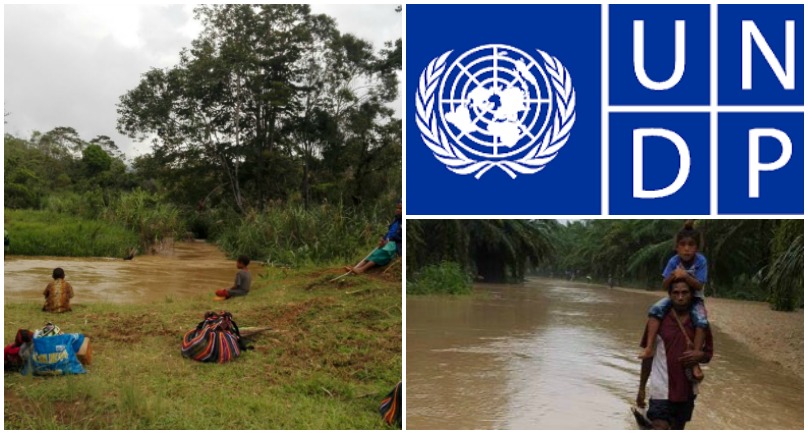By Hope Imaka – EM TV Online
PNG’s Climate Change Development Authority (CCDA) and the United Nation’s Development Programme (UNDP) presented a new report entitled ‘Assessment of the Early Warning Systems for Inland and Coastal Flooding in Papua New Guinea’ yesterday, Thursday, April 28.
The report elaborates on the current status of early warning systems in PNG and what needs to be done to set up an effective system for flooding.
PNG is ranked 54th among countries most exposed to multiple hazards, according to the World Bank’s Natural Disaster Hotspot study.
Being situated close to the equator, Papua New Guinea falls within the moist tropical rainforest zone with high to very high rainfall. Besides earthquakes and volcanic eruptions, the country is prone to various natural disasters both inland and coastal flooding, like that of the floods in Kimbe and Oro.
In early 2016 alone, PNG was hit with floods, landslides, droughts, frost, hailstorms and volcanic eruptions. These natural disasters affect various sectors such as community livelihoods, infrastructure and agriculture, and although these events cannot be prevented, advance warning and pre-planning can often reduce the impact from flooding.
To develop these systems, a CCDA/UNDP-led initiative conducted a study to assess the current state of early-warning systems in the selected five pilot territories: East Sepik, Madang, Lae, Northern and New Ireland provinces.
The study showed that there was no flood monitoring and warning system in place in PNG. Although communities alone have their own traditional adaptive knowledge on floods and other natural hazards, there is no way of dissemination of flood warnings information, and the same can be said for proactive measures taken to improve flood risk knowledge.
The report concludes that there is an urgent need for institutionalising strengthening of the organisations involved; it provides a roadmap for an effective community-based flood early-warning system. Some of the recommendations include:
- Restore and enhance the monitoring network
- Create capacity in monitoring and forecasting
- Disseminate flood warnings using cell phone technology, radio and traditional means in order to reach the last mile
- Create local ownership by involving stakeholders in a river basin committee of further activities, which will seek to establish early-warning systems and coordinate
Further action will be undertaken in frames of a wider ‘Enhancing Adaptive Capacity of Communities to Climate Change – related floods in the North Coast and islands Region PNG’ program, implemented by UNDP and CCDA, with funds from Adaptation Fund.
The four-year program aims to implement measures at the community level to cope with floods, as well as building institutional and policy capacities that promote efficient and cost-effective adaptation to coastal and inland flood-related risk.


